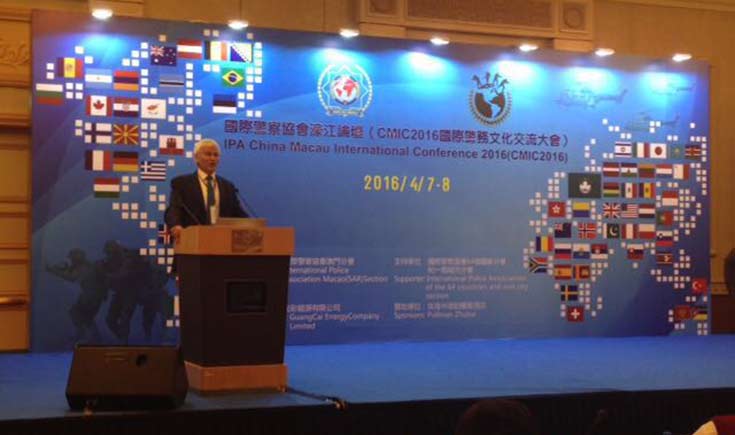IPA Global Anti-Terrorism Forum held in Macau
The International Police Association (IPA) Forum for Global Anti-Terrorism was held in Macau, China recently. The IPA is a worldwide, growing and outward looking organisation for police officers and staff, both serving and retired. It is an NGO in Consultative (Special) Status with the Economic and Social Council of the United Nations; and in Consultative Status with the Council of Europe, the Organisation of American States and UNESCO.

Roger Gomm of CRJ's Editorial Advisory Panel presented the keynote address at the event
The two days of the conference covered a range of issues. These included a presentation from Canada that concentrated on the causes of terrorism, exploring some myths and realities, motivation and the importance of horizon scanning to identify new trends or threats.
The conference also covered the changing face of terrorism, highlighting the scale, scope and globalisation of the threat, which requires international agreement and co-operation to target the finances and the violent extremism.
These early presentations led to much debate on how Western governments are desperately searching for the jihadi profile and how to identify a potential western jihadi. One area of disagreement was the role of the 'ordinary' police in the fight against terrorism. My view is that every police officer (police support staff and security staff) is a counterterrorism agent and they should be encouraged to consider all encounters with the public as a potential opportunity to fight crime by engaging the public, being visible and, where appropriate, proactive. A number of delegates, however, saw this as a 'specialist' area!
The role of community policing is the fight against terrorism was highlighted by informative case studies from Canada, Israel and Sweden.
The role of the police community relations in the prevention of radicalisation was also explored through both academic and operational examples. The 'staircase to terrorism' was used to demonstrate how an individual can develop negative views linked with perceived deprivation that leads to legitimacy of terrorist acts.
CRJ Editorial Panel Member Roger Gomm gave the keynote address at the conference. The areas he covered included:
-
What is terrorism;
-
What motivates terrorists; the terrorist strategy and do we understand what they want to achieve;
-
How the current threat has developed since and evolved, reflecting on Mumbai, Amenus and Westgate (which Roger wrote about in the CRJ article 9:3 Hat-trick of terrorists attacks) and how this has affected the UK and other countries (CRJ 10:2: The enduring threat of terrorism; and 11:2: A Continued and evolving threat);
-
Government strategy; and
-
Advice to business and the public, which included Run Hide Tell (CRJ 10:4: Preparing for the unthinkable) and dynamic lockdown.
-
The sessions generated much debate and questions.
Roger Gomm
Roger Gomm, 12/04/2016